Welcome to our free classical music site

Do you write about classical music? Are you a blogger? Want to team up with Classical Connect? Send us a message, let's talk!

Do you write about classical music? Are you a blogger? Want to team up with Classical Connect? Send us a message, let's talk!
January 28, 2013. Franz Schubert was born on January 31, 1797. We wrote quite extensively about his life, especially his earlier years (this of course is practically a misnomer, as Schubert died tragically young at the age of 31). During his short life he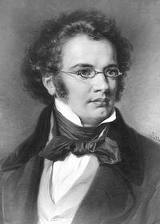 wrote more than 1000 compositions, of which 600 were songs. We think that even if all he wrote were songs, he would still be considered one of the greatest composers ever. His cycles Die schöne Müllerin, written in 1823, and Winterreise, written four years later, contain no less music of the highest order than symphonies of the most gifted composers. Both cycles were originally written for tenor, but are often transposed and performed by other voices. The late Dietrich Fischer-Dieskau, a baritone, was one of the greatest exponents (pianists such as Sviatoslav Richter, Alfred Brendel and Murray Perahia performed Schuber’s songs with Fischer-Dieskau). Gute Nacht is the first of the songs in the Winterreise cycle. Here it is performed by the German bass-baritone Thomas Quasthoff, with Daniel Barenboim on the piano (courtesy of YouTube). Fritz Wunderlich was one of the most brilliant tenors of the 20th century. Unfortunately, like Schubert’s, his life was cut short: he was only 35 when he died in an accident. Still, he left behind a number of exceptional recordings, Die schöne Müllerin being one of them. Here he sings Der Neugierige ("The Inquisitive One"), the sixth song in the cycle. Hubert Giesen is on the piano (courtesy of YouTube). Of course there are many other wonderful songs. Probably one of the most popular is An Die Musik, D. 547. Here it is, in the 1950 recording, sung by the great Elisabeth Schwarzkopf. She is accompanied by Edwin Fischer (also courtesy of YouTube).
wrote more than 1000 compositions, of which 600 were songs. We think that even if all he wrote were songs, he would still be considered one of the greatest composers ever. His cycles Die schöne Müllerin, written in 1823, and Winterreise, written four years later, contain no less music of the highest order than symphonies of the most gifted composers. Both cycles were originally written for tenor, but are often transposed and performed by other voices. The late Dietrich Fischer-Dieskau, a baritone, was one of the greatest exponents (pianists such as Sviatoslav Richter, Alfred Brendel and Murray Perahia performed Schuber’s songs with Fischer-Dieskau). Gute Nacht is the first of the songs in the Winterreise cycle. Here it is performed by the German bass-baritone Thomas Quasthoff, with Daniel Barenboim on the piano (courtesy of YouTube). Fritz Wunderlich was one of the most brilliant tenors of the 20th century. Unfortunately, like Schubert’s, his life was cut short: he was only 35 when he died in an accident. Still, he left behind a number of exceptional recordings, Die schöne Müllerin being one of them. Here he sings Der Neugierige ("The Inquisitive One"), the sixth song in the cycle. Hubert Giesen is on the piano (courtesy of YouTube). Of course there are many other wonderful songs. Probably one of the most popular is An Die Musik, D. 547. Here it is, in the 1950 recording, sung by the great Elisabeth Schwarzkopf. She is accompanied by Edwin Fischer (also courtesy of YouTube).
PermalinkJanuary 27, 2013. Wolfgang Amadeus Mozart was born on this day in 1756, 257 years ago. His genius reigns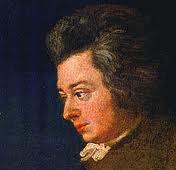 supreme today as it did 200 years ago, and as it will in 200 years. Here’s one reason why: the finale of Le Nozze Di Figaro: Pace Pace mio dolce tesoro (Now peace, my dearest treasure). Figaro: Bryn Terfel, Susanna: Alison Hagley, Count Almaviva: Rodney Gilfry. It’s followed by Gente gente all'armi all'armi (People, to arms!) for the full ensemble. The Monteverdi Choir, John Eliot Gardiner conducting (courtesy of YouTube).
supreme today as it did 200 years ago, and as it will in 200 years. Here’s one reason why: the finale of Le Nozze Di Figaro: Pace Pace mio dolce tesoro (Now peace, my dearest treasure). Figaro: Bryn Terfel, Susanna: Alison Hagley, Count Almaviva: Rodney Gilfry. It’s followed by Gente gente all'armi all'armi (People, to arms!) for the full ensemble. The Monteverdi Choir, John Eliot Gardiner conducting (courtesy of YouTube).
PermalinkJanuary 21, 2013. Approaching Mozart’s birthday. The genius of Mozart, whose birthday we’ll celebrate on the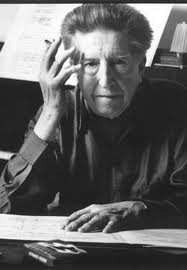 27th, overshadows all other composers born this week, but their contributions are substantial and worth mentioning. Henri Dutilleux will celebrate his 96th birthday tomorrow: he was born on January 22, 1916 in the historic town of Angers on the Loire River. Like so many other French composers, he studied at the Paris conservatory; he won the Grand Prix de Rome in 1938. Even though he started writing music early, Dutilleux wouldn’t number his compositions till the age of 30, as he considered his earlier pieces, including the Prize-winning cantata L'Anneau du Roi, not worth mentioning. Besides composing, he taught at the Ecole Normale de Musique and the Paris Conservatory. While influenced by Debussy and Ravel, Dutilleux’s music is highly original and contemporary. Here’s his String Quartet Ainsi la nuit (So, the night), from 1976. It’s performed by Wonhyee Bae and Tessa Lark, violins, Vicki Powell, viola, and Paul Dwyer, cello.
27th, overshadows all other composers born this week, but their contributions are substantial and worth mentioning. Henri Dutilleux will celebrate his 96th birthday tomorrow: he was born on January 22, 1916 in the historic town of Angers on the Loire River. Like so many other French composers, he studied at the Paris conservatory; he won the Grand Prix de Rome in 1938. Even though he started writing music early, Dutilleux wouldn’t number his compositions till the age of 30, as he considered his earlier pieces, including the Prize-winning cantata L'Anneau du Roi, not worth mentioning. Besides composing, he taught at the Ecole Normale de Musique and the Paris Conservatory. While influenced by Debussy and Ravel, Dutilleux’s music is highly original and contemporary. Here’s his String Quartet Ainsi la nuit (So, the night), from 1976. It’s performed by Wonhyee Bae and Tessa Lark, violins, Vicki Powell, viola, and Paul Dwyer, cello.
These days, Muzio Clementi, born January 24, 1752 and famous in his day, is mostly remembered as the composer of sonatas popular with music teachers, and also for his musical contest with Mozart in Vienna in 1781. Clementi and Mozart were to improvise on the themes suggested by the Emperor Joseph II, and play selections from their own compositions. The Emperor, for whose entertainment the contest was organized, diplomatically declared it a tie. But, though forgotten, Clementi did write some lovely music. Here’s his Sonata in B-flat Major, Op.24 No.2, played by the Korean-American pianist Young-Ah Tak. Note the opening bars of the sonata: they were later used by Mozart in his overture to the Magic Flute!
Also, Witold Lutoslawski, one of the greatest Polish (and European) composers of the 20th century, was born this week, on January 25, 1913. He stared studying violin, but later switched to piano and composition at the Warsaw conservatory. For a while he was also taking classes in mathematics at the University of Warsaw. Lutosławski was in the military when the Germans attacked Poland in September of 1939. He was captured but managed to escape. He made it to Warsaw and earned money by playing piano duets with his friend, the composer Andrzej Panufnik. After the Soviets liberated Poland and then installed a communist regime, life became increasingly difficult for Lutosławski.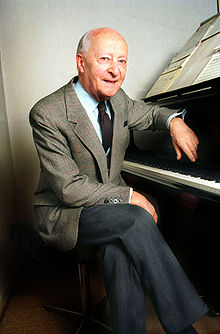 He was accused of “formalism” and his compositions were censored. These problems continued even after Stalin’s death, but eased somewhat after Lutosławski achieved international fame (Pierre Boulez premiered his Second symphony in 1966). Lutosławski, who always opposed communist rule, was a big supporter of the Solidarity movement in the early ‘80s. He was very prolific till the very end of his life. Lutosławski wrote four symphonies and a number of other symphonic compositions - concertos for piano, violin, cello (written and premiered by Mstislav Rostropovich) and many chamber and vocal pieces. Here’s Capriccio notturno ed Arioso from his Concerto for Orchestra (1950-1954). It’s performed by The Texas Festival Orchestra, Edwin Outwater conductor. The piece is written in Lutosławski’s earlier, “folkloristic” style, far removed from the atonal and even aleatoric music of his later compositions.
He was accused of “formalism” and his compositions were censored. These problems continued even after Stalin’s death, but eased somewhat after Lutosławski achieved international fame (Pierre Boulez premiered his Second symphony in 1966). Lutosławski, who always opposed communist rule, was a big supporter of the Solidarity movement in the early ‘80s. He was very prolific till the very end of his life. Lutosławski wrote four symphonies and a number of other symphonic compositions - concertos for piano, violin, cello (written and premiered by Mstislav Rostropovich) and many chamber and vocal pieces. Here’s Capriccio notturno ed Arioso from his Concerto for Orchestra (1950-1954). It’s performed by The Texas Festival Orchestra, Edwin Outwater conductor. The piece is written in Lutosławski’s earlier, “folkloristic” style, far removed from the atonal and even aleatoric music of his later compositions.
PermalinkJanuary 14, 2013. Even though César Cui was a minor composer, we decided to mention him because he was a member of The Five (or the Mighty Handful, as they are also known), a group of Russian composers organized by Mily Balakirev, whose birthday we celebrated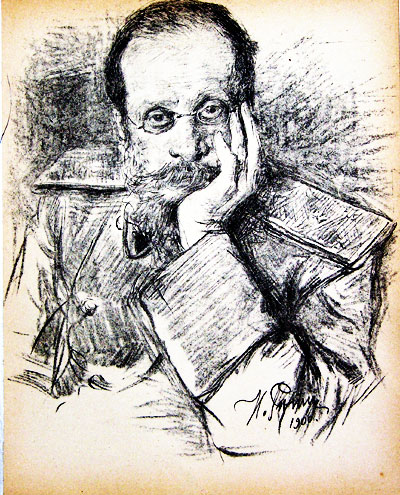 last week. Cui’s father, a Frenchman, entered Russia with Napoleon’s army, and after its catastrophic defeat settled in Vilnius, Lithuania. That’s were César was born, on January 18, 1835. As a boy he received piano lessons, but at the age of 15 was sent to St-Petersburg to prepare for engineering school, which he eventually entered. Upon graduating, he became quite famous for his work on military fortifications; he also taught at several engineering schools. But all along music was his real love, and he expressed it through composing and criticism (Cui wrote more than 800 articles, some of which were quite influential at the time). He composed several operas; these days are rarely staged, although Liszt seemed to have like one of them, William Ratcliff. Cui also wrote a large number of songs, some quite exquisite. Here ’s one, The statue in Tsarskoye Selo, Op.57, no. 17 on a poem by Alexander Pushkin. Recorded in 1954, it is sung by a 25 year-old Nikolai Ghiaurov who at the time was still studying at the Moscow Conservatory; a year later his career was launched. Ghiaurov of course became one of greatest basses of the 20th century. The portrait of Cui on the left is by Ilya Repin.
last week. Cui’s father, a Frenchman, entered Russia with Napoleon’s army, and after its catastrophic defeat settled in Vilnius, Lithuania. That’s were César was born, on January 18, 1835. As a boy he received piano lessons, but at the age of 15 was sent to St-Petersburg to prepare for engineering school, which he eventually entered. Upon graduating, he became quite famous for his work on military fortifications; he also taught at several engineering schools. But all along music was his real love, and he expressed it through composing and criticism (Cui wrote more than 800 articles, some of which were quite influential at the time). He composed several operas; these days are rarely staged, although Liszt seemed to have like one of them, William Ratcliff. Cui also wrote a large number of songs, some quite exquisite. Here ’s one, The statue in Tsarskoye Selo, Op.57, no. 17 on a poem by Alexander Pushkin. Recorded in 1954, it is sung by a 25 year-old Nikolai Ghiaurov who at the time was still studying at the Moscow Conservatory; a year later his career was launched. Ghiaurov of course became one of greatest basses of the 20th century. The portrait of Cui on the left is by Ilya Repin.
Cui’s French connection leads to two composers who were also born this week: Chabrier and Chausson. Emmanuel Chabrier was born in a small town in Auvergne on January 18, 1841. His family moved to Paris when Emmanuel was 15. Even though he was taking music lessons since he was six, his family felt that he should pursue a career in law, for which he was preparing while still in Auvergne. In Paris he entered law school, and upon graduating in 1861 Chabrier became a civil servant with the Interior Ministry. But, not unlike Cui, his real passion was music. He made friends with several young composers, Fauré, Chausson, and d'Indy among them, but also with the leading Impressionst painters, such as Manet, Monet, and Degas: Chabrier started collecting their art early and left behind a large collection of contemporary French art). He also became friends with a number of writers Zola, Daudet, and Mallarmé among them. In 1882 Chabrier visited Spain and a year later wrote his most popular orchestral work, España. You can listen to it here, with Igor Markevitch conducting the Orchestra of Spanish Radio & Television (courtesy of YouTube).
Chabrier’s friend Ernest Chausson was 14 years his younger: Chausson was born on January 20, 1855. His father Prosper was a wealthy contractor who helped Baron Haussmann to rebuild Paris. To please his father, the young Chausson, like Chabrier, studied law, but had very little interest in it. Ernest tried to write and paint, and then at the age of 25 started taking classes in composition with Jules Massenet at the Paris Conservatory. One of Chausson’s best-known works is Poéme, Op. 25. You can listen to it here, performed by Judy Kang , violin, and Kay Kim, piano.
Last week we mentioned the birthday of yet another Frenchman (and one of our favorites), Francis Poulenc. Here is his Piano Concerto in C sharp minor. The pianist is Jean-Bernard Pommier, with The City of London Sinfonia, Richard Hickox conducting.
PermalinkJanuary 7, 2013. In this first post of 2013 we’d like to mention several composers whose birthdays fall on the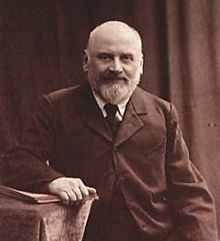 first week of the year: Mily Balakirev, Giovanni Pergolesi, Nikolai Medtner, Max Bruch, and Alexander Scriabin. On top of this, Francis Poulenc was born on this day. A mighty handful for sure. “Mighty handful” was, of course, the name given to a group of Russian composers of the mid-19th century, and Balakirev, born on January 2, 1837, was one of them. Probably not the most talented (musically, Mussorgsky, Borodin, and Rimsky-Korsakov were in a different league), he is now known mostly as an educator and incessant promoter of classical music in Russia. He did, however, compose a piano piece which to this day is considered one of the most difficult, a poem Islamey. Here it is, performed by the Italian pianist Sandro Russo.
first week of the year: Mily Balakirev, Giovanni Pergolesi, Nikolai Medtner, Max Bruch, and Alexander Scriabin. On top of this, Francis Poulenc was born on this day. A mighty handful for sure. “Mighty handful” was, of course, the name given to a group of Russian composers of the mid-19th century, and Balakirev, born on January 2, 1837, was one of them. Probably not the most talented (musically, Mussorgsky, Borodin, and Rimsky-Korsakov were in a different league), he is now known mostly as an educator and incessant promoter of classical music in Russia. He did, however, compose a piano piece which to this day is considered one of the most difficult, a poem Islamey. Here it is, performed by the Italian pianist Sandro Russo.
Giovanni Battista Pergolesi’s life was tragically short. He was born on January 4, 1710 and died at the age of 26, from tuberculosis. He wrote his first opera when he was 21, the first truly successful piece, an intermezzo La Serva Padrona (The Servant Mistress), at the age of 23. He wrote six operas altogether, a violin concerto, and some other secular music, but for the last two years of his life he wrote mostly sacred music. He composed two Masses, several psalm settings and more. You can listen to one of his most famous works, Stabat Mater, here; it’s performed by the Chicago authentic instruments ensemble Baroque Band.
Nikolai Medtner, born on January 5, 1880, was a younger contemporary of the much more famous Rachmaninov and Scriabin, but he wrote a number of charming piano pieces called Tales and several sonatas, some of them very interesting. Here, for example, Marc-André Hamelin plays Medtner’s Piano Sonata no.13, Minacciosa (courtesy of YouTube). As so many artists and composers, Medtner left Russia after the Revolution (he was helped by his friend Rachmaninov) and eventually settled in England. He died in London in 1951. His music is very much worth discovering.
Alexander Scriabin’s music doesn’t need to be "discovered" – it’s being widely played and recorded. Still, his popularity these days cannot be compared to the adulation he receiving during his lifetime (accompanied by some criticism as well). Scriabin was born on January 6, 1872. His early piano compositions were heavily influenced by Chopin, though even then his style was individual and idiosyncratic. Later it evolved, losing most of the romantic traces of the earlier period, and becoming more chromatic and dissonant. Scriabin’s piano works are more popular these days than his orchestra music, but in the pre-Revolutionary Russia his The Poem of Ecstasy was one of the most celebrated composition (he received one of his many Glinka Prizes for it in 1908). Here it is performed by the Chicago Symphony Orchestra, Pierre Boulez conducting (courtesy of YouTube).
We have to mention Max Bruch, born on January 6, 1838 and these days mostly famous for his Violin Concerto. He also wrote a popular Kol Nidrei for cello and orchestra, named after the ancient declaration recited in synagogues before the beginning of the Yom Kippur (Day of Atonement) service. Bruch was a protestant, and introduced to the Jewish prayer by his teacher. Still, many Germans though that Bruch was Jewish, and the Nazis even banned his music. Here’s an arrangement of Kol Nidrei for viola and piano. It’s performed by Viacheslav Dinerchtein, viola, and George Lepauw, piano.
PermalinkDecember 31, 2012. Forgotten birthdays. Throughout the year we’ve celebrated dozens of composers, the great ones, whose work form the foundation of western musical tradition, as well as some minor ones along the way. We try to do it on the weeks of their birthdays, but that creates a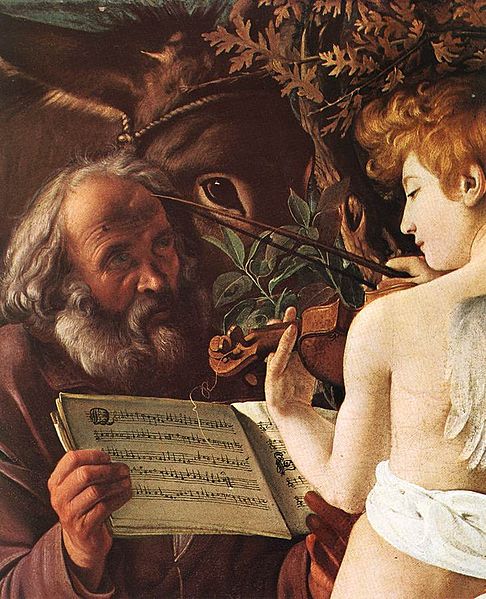 problem: we don’t know when some of the composers were born! Here’s an incomplete list of very influential composers who never made it on our pages for that very reason: Josquin des Prez, who was born sometime around 1450, the supreme master of the Renaissance polyphonic form; Thomas Tallis, one of the greatest early English composers, born around 1505; Orlando di Lasso, sometime spelled as Orlande de Lassus, born around 1530, a Franco-Flemish/Netherlandish composer as Des Prez and also a great master of polyphony; Giovanni Gabrieli, the Venetian born around 1550 and the master of San Marco; Tomás Luis de Victoria, the most famous (and important) Spanish composer of his time, who was also born around 1550; Dietrich Buxtehude, born around 1637, one of the most interesting German Baroque composers of the era preceding Johann Sebastian Bach’s; and there are many more.
problem: we don’t know when some of the composers were born! Here’s an incomplete list of very influential composers who never made it on our pages for that very reason: Josquin des Prez, who was born sometime around 1450, the supreme master of the Renaissance polyphonic form; Thomas Tallis, one of the greatest early English composers, born around 1505; Orlando di Lasso, sometime spelled as Orlande de Lassus, born around 1530, a Franco-Flemish/Netherlandish composer as Des Prez and also a great master of polyphony; Giovanni Gabrieli, the Venetian born around 1550 and the master of San Marco; Tomás Luis de Victoria, the most famous (and important) Spanish composer of his time, who was also born around 1550; Dietrich Buxtehude, born around 1637, one of the most interesting German Baroque composers of the era preceding Johann Sebastian Bach’s; and there are many more.
We’ll write about these composers in the future, but in the mean time here’s from one of our personal favorites, Tomás Luis de Victoria. It’s a short piece for four voices called O vos omnes (Oh, all ye) and it comes from his liturgical setting, Tenebrae Responsories, which is celebrated on early mornings of the last three days of Holy Week. It’s performed by The Tallis Scholars (here, courtesy of YouTube).
The angel playing the violin, above, is by Caravaggio, from his Rest on the Flight into Egypt. He painted it around 1597 in Rome, about 10 years after Victoria left the city, where he lived and studied the previous 20 years, to return to his native Spain.
Happy New Year to all!Permalink